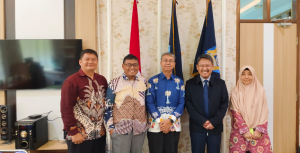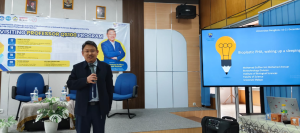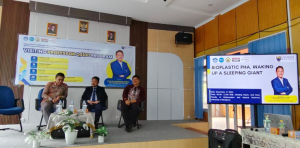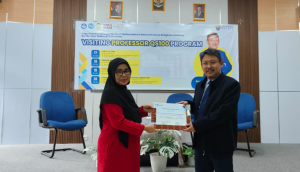
Biology Department, Faculty of Mathematics and Natural Sciences, University of Bengkulu Hosts the World Class Professor Program From Institute of Biological Sciences, Faculty of Science, Universiti Malaya
17 December 2024, Held in the Dean Main Room, 2nd floor of Dean Building, Biology department successfully organized a public lecture with Prof. Dr, Mohamad Suffian Bin Mohammad Annuar, a Professor from the World-class, From Institute of Biological Sciences, Biotechnology Division, Faculty of Science, Universiti Malaya, Malaysia. The lecture focused on the study theme “Bioplastic PHA, Waking Up a Sleeping Giant ” and was directly moderated by Dr. Risky Hadi Wibowo M.Si, an expert lecturer in Microbiology.
The Dean of Faculty of Mathematics and Natural Sciences, Prof. Dr. Sal Prima Yudha S, M.Si, officially opened the event and was introduced by the Head of Biology Department, Dr. sipriyadi M,Si. In this public lecture, Prof. suffian presented the results of his research, which focused on several microbes that have a potency to produces of biodegradeble plastics on of them is PHA.
He shared case studies about the plastic is widely utilized in packaging, frameworks, and as coverings material. Its overconsumption and slow degradation, pose threats to ecosystems due to its toxic effects. While polyhydroxyalkanoates (PHA) offer a sustainable alternative to petroleum-based plastics, their production costs present significant obstacles to global adoption. On the other side, a multitude of household and industrial activities generate substantial volumes of wastewater containing both organic and inorganic contaminants. This not only poses a threat to ecosystems but also presents opportunities to get benefits from the circular economy.
Production of bioplastics may be improved by using the nutrients and minerals in wastewater as a feedstock for microbial fermentation. Strategies like feast-famine culture, mixed-consortia culture, and integrated processes have been developed for PHA production from highly polluted wastewater with high organic loads. Various process parameters like organic loading rate, organic content (volatile fatty acids), dissolved oxygen, operating pH, and temperature also have critical roles in PHA accumulation in microbial biomass.
This public lecture activity was also attended by the vice dean of academic affairs Prof. Dr. Morina Adfa M.Si, vice dean of Sudent, alumni and coorporation affairs Prof Dr. Arif Ismul Hadi, M.Si , biology lecturers and students from the Biology Department, FMIPA UNIB.



